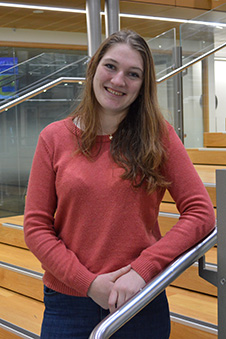A project led by an Otago student to save the lives of newborns suffering from jaundice in Nigerian villages that lack electricity is the winner of the Windeaters Social Entrepreneur Award in a New Zealand-led contest, the Global Enterprise Experience.

Helena Hannås led her global team to win the Windeaters Social Entrepreneur Award.
University of Otago Business School student, Helena Hannås, led a global team of eight members dispersed around the planet living in Nigeria, New Zealand, Fiji, Colombia and the Netherlands. The team was challenged with developing a business concept proposal that would address a United Nations Sustainable Development Goal with limited capital.
As a part of the MGMT22 paper Helena entered the competition and took on the leadership role in her group. Nigerian teammate, Oluwatomilola Idris Mustapha, developed the concept of a carry bag with flexible solar panels on the top and LED blue light inside the roof of the bag.
It was Helena's job to help organise her team and their ideas. That involved navigating different time zones and languages.
Helena, who has just completed her study in New Zealand, is working towards a Bachelor of Economics and Administration back home in Norway. Meanwhile, her teammates study a variety of subjects including design and international business.
Her understanding of the financial aspect of delivering a business plan was an asset as the leader of her team.
“It was easier for me to take the lead because I knew what we were doing and sort of knew what they were expecting,” she says.
Helena enjoyed her experience in the competition and as she heads back to Norway she takes back a passion for entrepreneurship.
“This might be an opportunity to pursue things like this forever but I don't have any plans for the future at the moment.”
The idea of a portable incubator is one Oluwatomilola has always dreamed of bringing to life.
“I am so excited to begin the Blue Care enterprise aimed at saving the lives of millions of babies,” Oluwatomilola says.
Jaundice is a serious condition for newborns but is easily treated with blue light. In Nigeria around 30 per cent of infant deaths are associated with jaundice compared with just 2 per cent in developed countries. Severe jaundice can also cause irreversible brain damage.
Oluwatomilola and his Nigerian teammate Dahunsi Elizabeth will receive NZD$4,000 for making the Blue Care idea happen. They need to raise an additional NZD$2,000 to get the life-saving product to market.
“My team members from Nigeria were so enthusiastic about it and it was so easy for me to work with them because of that enthusiasm,” Helena says.
Dr Dai Gilbertson of Windeaters, who sponsored the award, says Mr Mustapha's entrepreneurial spirit was boundless.
“During the contest Nigeria was in COVID-19 lockdown so he climbed the fence behind his home to get enough cell phone signal to communicate with his global colleagues. He also taught himself 3D modelling during the three-week contest to present the idea more clearly to the judges.”
The University of Otago Business School enrolled 83 students in the contest.
Their academic leader, Virginia Cathro, says the students learnt what it means to work across cultures and time zones and use business as a sustainable way of creating a better world.
“I was particularly impressed with the 30 students who volunteered for the tough job of leading the teams. Five of our students won awards for their leadership and team proposals, but all of our students grew as global leaders.”
The Victoria University of Wellington Champion Team Award went to a team led by Wellington student, Ben Murdoch, that proposed using waste plastic to produce lightweight bricks in Nigeria.
The University of Otago Business School Champion Peer-Leader Award went to Nóra Vilmányi who is studying in the Netherlands. Her team leader was sick and not coping, so Nóra stepped up to pull together her colleagues from New Zealand, Netherlands, China, the United States and Malaysia.
The 120 teams in the contest used 47 technologies to communicate and manage their teams. But most of these technologies are blocked in China. So Nóra faced the added complication of getting her team onto Chinese technologies as a way of building an inclusive, global team.







